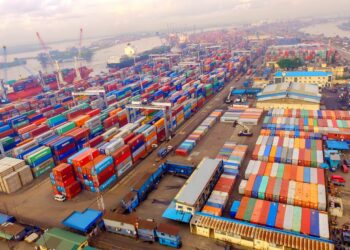For an election year, 2019 was unexpectedly an eventful year for Nigeria’s farm economy. Chief Audu Ogbeh bowed out and was replaced by Alhaji Sambo Nanono as minister for Agriculture and Rural Development.
In figures, the agriculture sector grew by 14.88% year-on-year in nominal terms in Q3 2019 recording a decline of—2.89% points and 7.7% points for the preceding Q2 and Q1 which recorded 17.76% and 22.58% points growth respectively.
In real terms, the agricultural sector grew by 2.28% (year-on-year) in the third quarter of 2019, an increase by 0.37% points from the corresponding period of 2018, and 0.49% points from the preceding quarter which recorded a growth rate of 1.79% it, however, fell 0.82% points against 3.17% recorded for Q1 2019.
In terms of contribution, the sector contributed 29.25% to overall real GDP during the quarter, same as a contribution in the third quarter of 2018 but higher than the second and first quarters of 2019 which stood at 22.78% and 21.91% respectively.
Crop production grew by 2.41% in Q3 2019 from 1.94% in Q2 2019 while Q1 recorded 3.27%.
The livestock sector grew by 0.02% in Q3 2019 after it contracted by -0.01% in Q2 2019 from 0.88% in Q1 2019.
Forestry grew by 2.19% in Q1 2019; 3.23% in Q2 and 3.78% in Q3. While fishing grew by 7.09% in Q1; 1.09% in Q2 and 1.68% in Q3.
Under manufacturing, Food, Beverage and Tobacco sectors grew by 2.98% in Q3 2019 from 1.22% in Q2 2019 and 1.76% in Q1 2019.
HIGHLIGHTS
2019 was overcast by the General Elections, especially the presidential elections which returned the incumbent President Muhammadu Buhari for a second and final term of four years.
In spite of the delay in the appointment of ministers by the President until late in August and the judicial process which later decided the final winner of the highly contentious elections, policy pronouncements were uninterruptedly made, which significantly impacted on the sector.
Bankers Recommitment
The major constraints of agriculture in Nigeria have been funding and markets, as the sector had been considered non-attractive to financiers in the past, fortunately, it appears to have shed its ugly toga through the makeover efforts of state actors and young enthusiasts, who have passionately taken the agricultural space by storm. Defying the lure of white-collar jobs or the lack of it.
In 2019, financial institutions sustained efforts to outdo themselves in connecting with the sector, as most of the major banks held highly publicized and well-attended investment summits, where they declared undying love and pledged renewed support for the sector.
However, the financial institution that showed the most love to the sector was the Central Bank of Nigeria, which acted like the Biblical Father that received his prodigious son, by throwing him a party and giving him his signet ring to symbolize his rightful place once again.
It was a bounty of favors by the CBN to farmers this year, as the apex bank was determined to bankroll more farm activities with competitive and comparative local advantages and protect them from the strangulation of food imports.
Dairy
This year, milk imports were added to the list of food items barred from obtaining foreign exchange through official channels.
In a circular to lenders, the central bank said milk imports will no longer be eligible under payment terms known as “bills for collection” which allowed the importer to buy on credit. Importers would need to fund their naira accounts and open letters of credit.
The directive was given in order to save between $1.2 billion to $1.5 billion annually spent to import milk.
Rather than an endless reliance on milk imports, the CBN approached some milk importers, as was done for rice, tomato, and starch importers, offering them low-interest loans to begin local milk production.
The CBN governor scathingly rebuked those seen as cogs in the wheel of progress, for still treating the national aspiration to produce sufficient milk locally with imperial contempt.
He, however, acknowledged some successful efforts in the local production and pledged to provide the needed finance to enable investors who genuinely want to engage in milk production.
Cotton
Cotton growers also got a feel of the CBN’s protective arm around them with a directive to DMBs to restrict the sale of foreign exchange to importers of textiles and other clothing materials in the country.
The CBN believes the measure will reposition the textile, cotton and garment industry for job creation and the development of the economy.
As part of its Anchor Borrowers Programme, the bank would support local growers of cotton to enable them to meet the needs of the textile industries in Nigeria.
The CBN would also support efforts to source high-yield cotton seedlings so as to ensure the yields from cotton farmers met global standards.
Emefiele said the bank would intensify efforts with the state governments and others that might show a keen interest in the quick actualization of such programs, which would include clusters or parks with a steady power supply.
What is most instructive as we countdown to 2020 in hours, is the CBN’s initial support to importers of cotton lint for use in textile factories, with a caveat that such importers begin sourcing all their cotton needs locally beginning from the year 2020.
Oil Palm
CBN further committed about N30 billion to ramp up oil-palm production in the country, the fund was disbursed through deposit money banks to six oil palm companies to back their expansion programs. Meanwhile, 40 applications from other investors across the country for the cultivation of 126,694 hectares are also being considered.
Local demand is currently at 2.5 million metric tonnes per annum, while local capacity is at 1.25million metric tonnes, leaving a gap of 1.25million metric tonnes per annum which is being serviced through imports.
Closing the gap and positioning Nigeria to incrementally export oil palm products to neighboring countries and beyond is what the CBN oil palm initiative aims to achieve.
CBN is committed to ensuring that a minimum of 1.4 million hectares of land is cultivated with palm trees in three years.
So far the Apex bank has extracted commitments from 14 State Governors to make available 100,000 hectares of land each.
Blanket Ban On Forex
Not satisfied with the selective restriction of forex to import certain food items, President Muhammadu, declared that Nigeria had achieved food security, and as such, the foreign reserve will be conserved and utilized strictly for diversification of the economy, and not for encouraging more dependence on foreign food import bills. He directed the CBN Governor to implement a blanket ban on forex issuance for food importation.
The Apex bank promptly complied as this was already in line with its foreign exchange policies that started since 2016 with about 41 food and non-food items, a list that grew to 44 (mostly food items) before the presidential directive.
Temporary Border Closure
Most talked about of all that impacted agriculture in 2019, is the ongoing border closure policy of the federal government – a protectionist measure aimed at essentially boosting the local production and consumption of home-grown food. Even though it has negatively affected retail and FMCG export, it has provided a significant boost in the fortunes of rice and poultry producers.
Banned Exports: Beans and Hibiscus
More than three years after the EU banned the importation of Nigerian beans on the premise of chemical residue and pest infestation, the ban is yet to be officially lifted, six months after it lapsed.
In the same vein, Mexico banned the importation of hibiscus from Nigeria and despite giving a condition for the lifting of the ban, Nigerian hibiscus export to Mexico is yet to resume. More so as exporters are not willing to allow the Nigerian Agricultural Quarantine Services to oversee the processing of their hibiscus plants for export.
Farm Portfolio Investment
The emerging trend of farm portfolio investments really caught on in 2019, as investment companies or brokers enrolled more farms, adopting best practices and improved technology with guaranteed off-takers/markets. This, coupled with backing from insurance companies on the capital guarantee, shored up investor confidence and resulted in early full subscription of investment windows.
Major crops adopted by brokers include rice, onion, soybeans, sorghum, maize, and groundnuts. Aquaculture and poultry were also not left out.
Project Great Green Wall: Trees for Peace
Nigeria this year went a step further in plans to combat climate change and mitigate its impact on agriculture. Aside from just combating the effect of climate change, Nigeria is also seeking to stem the perennial violence between herders and farmers through an initiative called the Great Green Wall, a planting of 25 million trees in Nigeria announced by President Buhari, at this year’s United Nations special conference on climate change.
According to President Buhari, who noted that desertification was squeezing opportunity of the rural dwellers who constitute over half of the country’s population and relied on agriculture as their mainstay.
“A desert is advancing on Nigeria and its neighbors. Each year, the Sahel cuts deeper into the land, overtaking farmlands, rupturing biodiversity and breeding insecurity. In my country, these are the real-world ramifications of climate change happening now. And it is time to fight back—with trees. We must use nature’s basic material (all too often overlooked) for solutions to one of the continent’s greatest challenges.”
Acting as a bulwark against climate change and ecological breakdown, the trees shall hold back the advancing tide of dunes, restore biodiversity and healthy soils and serve as a great carbon sink—soaking up the CO2 emissions that humans have already released into the atmosphere, the further President noted
“Critically, ecological restoration reduces the threat of land disputes. In the dry season, barren—often drought-stricken—pastureland in the Sahel forces nomadic herders to drive their cattle further south to graze. Here they come into conflict with sedentary farmers, whose numbers have increased with exponential population growth. Two livelihoods—one itinerant, one settled—compete for dwindling resources and clashes break out; vast human and economic costs have been the result. If this ecological breakdown continues unabated, it will only exacerbate this competition for land,” Buhari stated.
The Great Green Wall is a project that stretches 8,000 kilometers.
Green Bonds
President Buhari identified innovative financing solutions such as sovereign green bonds as presenting a path forward to fund ambitious climate change initiatives.
“In 2017, Nigeria became the first African nation to issue one. In June, we issued another, and it was oversubscribed. Fortunately, these initial forays show a clear appetite for this sort of investment, and we are currently working on further issuances,” he said.
What to Expect In 2020
Nigeria’s agriculture is becoming more knowledge-driven and is causing the investment space to open up faster than expected, despite the fact that it only gets a paltry 1.4% budgetary allocation. This goes against the spirit of the Malabo Declaration ratified by Heads of States and Government of the African Union meeting in June 2014, in Malabo, Equatorial Guinea, of which Nigeria is a party.
One of the two recommendations was to enhance investment finance in Agriculture by upholding 10% public spending target.
In 2020 expect more Diaspora injection of funds in the agricultural sector.
Expect heads to roll at research institutes for poor performance, especially as the Minister has promised to pay special attention to the institutes and reposition them for greater contribution to the sector.
Expect more technology-based home-grown solutions and applications for tackling agro-allied problems and more importantly to encourage investment.
Expect more large-scale farms as the government continues to encourage the growth of the sector through single-digit loans and protectionist policies.
And expect the full re-introduction of the Nigerian Agricultural Quarantine Services at the ports and borders. Their presence is critically needed to reinject professionalism and restore confidence in the quality and global standardization of Nigerian agricultural exports.
Expect the Seed Tracker app developed by Nigeria’s National Seed Council in collaboration with IITA to boost Nigeria’s dominance in the West African seed industry, which it already controls 70% of. The app can aid farmers to see what is happening in the seed value chain, from the beginning to the end of it.
Expect a stronger working relationship between the Federal Ministry of Agriculture and Ministry of Science and Technology, as the focus will be on the expansive adoption of locally fabricated machines of global standards being produced in the country.
Expect more networking among agripreneurs, who are becoming an energetic army of young educated people.
Post-harvest losses will continue to be at the mercy of infrastructure deficit, cold-chain investments will be hampered by the unreliable power supply.
The sector will add more new jobs as farm wealth becomes more projected by young agripreneurs, it is expected to exert peer pull.
Information on funding channels and government interventions will become more readily available as most MDAs are using social media handles to pass on information. NIRSAL is particularly doing so well in this regard.
Lastly, expect the profile of Alhaji Sabo Nanono to finally find a way to replace that of his predecessor on the FMARD official website more than four months after he assumed office.



